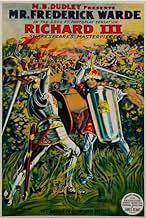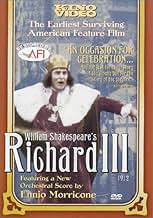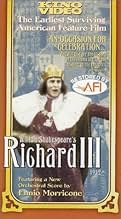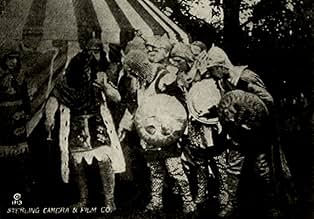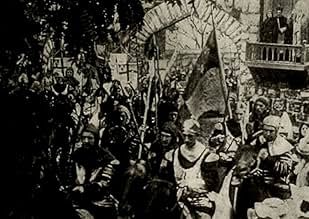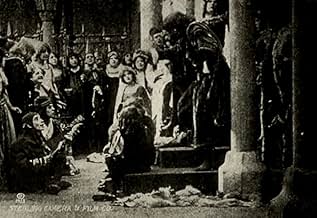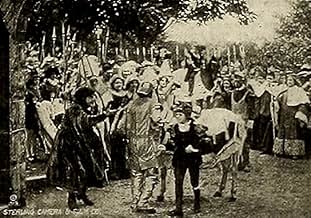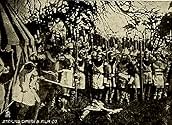Füge eine Handlung in deiner Sprache hinzuRichard of Gloucester uses manipulation and murder to gain the English throne.Richard of Gloucester uses manipulation and murder to gain the English throne.Richard of Gloucester uses manipulation and murder to gain the English throne.
- Regie
- Drehbuch
- Hauptbesetzung
Empfohlene Bewertungen
Credited as the earliest complete feature-length American film known to still exist and restored by the American Film Institute, "The Life and Death of King Richard III" is otherwise of little value. Rarely is Shakespeare nearly as boring. Yes, the film is a symptom of its time; I also watched "Queen Elizabeth" (1912) today (it wasn't a very good day), and both are arid and static adaptations from the stage, histrionic acting included, but without sound, or any other qualities of the theatre. Films such as these, however, were coincident with films by others like D.W. Griffith; one can easily see which was advancing the medium and which was hampering it.
Like many a heralded silent movie, this was lost for many years. Then it turned up in a private collection, and was donated to the AFI. They got Ennio Morricone to write a score and released it, claiming it was the first American feature, and the first Shakespearean feature.
It's true enough that Shakespeare is credited as a writer, and it follows the events of his play, but to offer a silent version of Shakespeare with not one of his lines seems to me to avoiding the pith and purpose of Shakespeare. True, few can cite more than three lines: "A horse, a horse, my kingdom for a horse"; "Now is the winter of our discontent made glorious summer by the sun of York"; and "Was ever a woman in this humor wooed? Was ever a woman in this humor won?" And usually they don't understand the second and misquote the third as "Was ever a woman so rudely wooed?". This led me and a friend to plot a production with Groucho Marx as Richard, Margaret Dumont as Anne, with similar casting throughout.
Not one of Shakespeare's lines is offered, reducing the play to sheer pomp and pageantry. This avoids the problem that Richard is one of Shakespeare's worst-written characters: an enormously cynical, murderous, and successful politician until he becomes King, who then turns into an idiot; a cowardly and feeble hunchback who is a monstrously courageous and doughty warrior in war. All this in service of the Elizabethan-era truth that he should never have been king, and that her grandfather performed a valiant deed by slaying Richard on the battlefield.
The result is a movie made in the Illustrated Text style of movie making without quoting one line of text. There are lots of extras shaking spears. I suppose that's enough for people who want to say they've seen Shakespeare. As for Frederick Warde, who plays Richard here, he later wrote
"I found the action of the camera necessitated entirely different methods of acting from the stage. Spontaneity must be replaced by deliberation and concentrated expression take the place of words. I had much to learn and considerable to unlearn but the director and photographer were very considerate, although my ignorance of the necessities of the camera must have tried their patience almost to the limit."
Which brings us back to another popular Groucho quote. Enough said.
It's true enough that Shakespeare is credited as a writer, and it follows the events of his play, but to offer a silent version of Shakespeare with not one of his lines seems to me to avoiding the pith and purpose of Shakespeare. True, few can cite more than three lines: "A horse, a horse, my kingdom for a horse"; "Now is the winter of our discontent made glorious summer by the sun of York"; and "Was ever a woman in this humor wooed? Was ever a woman in this humor won?" And usually they don't understand the second and misquote the third as "Was ever a woman so rudely wooed?". This led me and a friend to plot a production with Groucho Marx as Richard, Margaret Dumont as Anne, with similar casting throughout.
Not one of Shakespeare's lines is offered, reducing the play to sheer pomp and pageantry. This avoids the problem that Richard is one of Shakespeare's worst-written characters: an enormously cynical, murderous, and successful politician until he becomes King, who then turns into an idiot; a cowardly and feeble hunchback who is a monstrously courageous and doughty warrior in war. All this in service of the Elizabethan-era truth that he should never have been king, and that her grandfather performed a valiant deed by slaying Richard on the battlefield.
The result is a movie made in the Illustrated Text style of movie making without quoting one line of text. There are lots of extras shaking spears. I suppose that's enough for people who want to say they've seen Shakespeare. As for Frederick Warde, who plays Richard here, he later wrote
"I found the action of the camera necessitated entirely different methods of acting from the stage. Spontaneity must be replaced by deliberation and concentrated expression take the place of words. I had much to learn and considerable to unlearn but the director and photographer were very considerate, although my ignorance of the necessities of the camera must have tried their patience almost to the limit."
Which brings us back to another popular Groucho quote. Enough said.
Watching Shakespeare without dialog isn't as challenging as you might think. Indeed, this 1912 film manages to condense the play neatly and still retains much of the power of the piece without hearing - or even reading - the words. Much of the success of "Richard III" is due to the vivid characterization by Frederick Warde, but his costars are excellent too. The direction is basic, of course, and every so often director-star James Keane wastes precious time (what's up with that long semi-tracking shot of the ship?), but generally his work is more than adequate. Comparing Keane's work here to the pioneering 1911 Italian feature "L'Inferno", it's clear that the American did have knowledge of what was going on elsewhere, even if he (of course) fell far short of what D.W. Griffith was already doing. Overall, "Richard III" will be of considerable interest to silent-film fans as well as stage performers interested in viewing the work of 19th century master Warde. Otherwise, I doubt this movie will thrill many other viewers. But I could be wrong; check it out for yourself.
Besides its historical importance, this silent screen adaptation of Shakespeare's "Richard III" is a pretty good movie in its own right. It has several good features that compensate for the lack of dialogue and the other cinematic limitations of the time. The result is something a bit different from watching the play, but still a good story that does retain much of the emphasis of the original.
The adaptation is noteworthy for the liveliness and the detail that went into most of the scenes. They also made generally good decisions in adapting the story, by high-lighting the parts that would work most effectively on film without dialogue, and also in filming some events that were not actually in the play but to which characters in the play refer. While the lack of dialogue means that the character of Richard is not as complex as he is in the play, Frederick Warde does a good job of making his basic character come out. Some of his scenes work better than you might have expected them to without the advantage of spoken lines. The camera is fixed for each scene, as was then the norm, and it also uses the old-fashioned 'tableau' format, but there are a number of uses of cross-cutting, and there are also a couple of simple tracking shots at effectively chosen moments.
Overall, this is creative for its era, and it works quite well. It deserves to be seen in its own right, as well as for its more well-known historical significance.
The adaptation is noteworthy for the liveliness and the detail that went into most of the scenes. They also made generally good decisions in adapting the story, by high-lighting the parts that would work most effectively on film without dialogue, and also in filming some events that were not actually in the play but to which characters in the play refer. While the lack of dialogue means that the character of Richard is not as complex as he is in the play, Frederick Warde does a good job of making his basic character come out. Some of his scenes work better than you might have expected them to without the advantage of spoken lines. The camera is fixed for each scene, as was then the norm, and it also uses the old-fashioned 'tableau' format, but there are a number of uses of cross-cutting, and there are also a couple of simple tracking shots at effectively chosen moments.
Overall, this is creative for its era, and it works quite well. It deserves to be seen in its own right, as well as for its more well-known historical significance.
This was a very, very early full-length film. According to the video box, it was the first full-length American-made film, but that is debatable--as several films have made that claim and exactly what constitutes "full-length" is pretty vague. Regardless, I have to commend the cast for trying something unique and epic, though in today's light the film is a totally boring mess and only of interest to cinephiles. Instead of the modern notion of story-telling and action, the crew was breaking new ground and made a bizarre film that appears more like a series of vignettes instead of a coherent film. Instead of a moving and evolving narrative like we are used to, the film was made with a real-life traveling acting troop. But, instead of having them act out the story, the film shows inter-title cards that describe what has occurred and the cast pose like they are going to be photographed or just make a few minimal movements or actions until the next card appears to describe an all-new scene. It's almost like looking at a series of stereoscope cards that move just a little and all together tell a very, very dull story. Very static and horrid to watch, it DID try something different and this is an amazingly important film historically--I just would NEVER want to have to watch it again!
Wusstest du schon
- WissenswertesThought lost for decades, but a pristine print (believed to be the oldest known complete surviving feature film made in the US) was discovered by a private collector in 1996 and donated to the American Film Institute.
- VerbindungenFeatured in Keepers of the Frame (1999)
Top-Auswahl
Melde dich zum Bewerten an und greife auf die Watchlist für personalisierte Empfehlungen zu.
Details
- Erscheinungsdatum
- Herkunftsländer
- Sprachen
- Auch bekannt als
- Mr. Frederick Warde in Shakespeare's Masterpiece 'The Life and Death of King Richard III'
- Drehorte
- Produktionsfirmen
- Weitere beteiligte Unternehmen bei IMDbPro anzeigen
Box Office
- Budget
- 30.000 $ (geschätzt)
- Laufzeit55 Minuten
- Sound-Mix
- Seitenverhältnis
- 1.33 : 1
Zu dieser Seite beitragen
Bearbeitung vorschlagen oder fehlenden Inhalt hinzufügen


